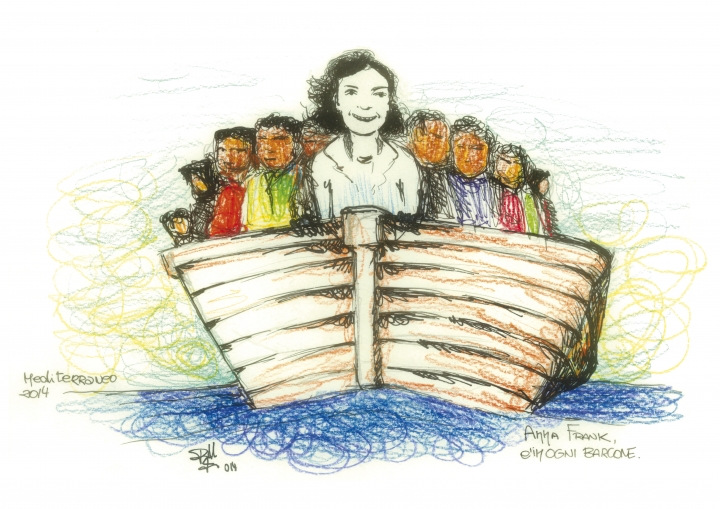
Artwork by Francesco Piobbichi
Story: If the face in the prow of the boat looks familiar, it’s because it is that of Anne Frank. Most of us know her story. Though she died of typhus in the Bergen-Belsen concentration camp in 1945, Anne’s words live on in a book that has since been translated into over sixty languages: The Diary of a Young Girl. Penned during the years she and her family were in hiding from the Nazis (1942-1944), Anne’s diary gives us a tender and terrifying glimpse into the soul of a young woman who ached to live in a world free of hate, persecution, and war.
What many do not know is that Anne’s father, Otto, tried desperately to get his family out of the Netherlands. His efforts were thwarted in part by the restrictive immigration policies of the United States. Anne is portrayed with a smile in this drawing, but perhaps the artist, Francesco Piobbichi, is inviting us to imagine Anne finally making her escape with others who share her hopes and dreams of a life free from hate, persecution, and war. He may also be nudging us into asking ourselves an uncomfortable question: If we care so much about Anne Frank, why don’t we care more about the lives of the other people in the boat?
Bible Reading: Hebrews 13:1-3 (NRSV)
This passage from Hebrews urges us to “show mutual love.” It’s another way of stating Jesus’ golden rule: “do to others as you would have them do to you” (Luke 6:31). Of course, this requires both imagination and empathy—both of which seem to be in short supply sometimes. Still, if we could manage to drum up even a little bit of both, we might find it easier—and more urgent—to open our hearts and wallets to refugees. “What if I were on one of those rickety boats, trying to make my way across the Mediterranean?” we might ask. “What if I had given everything I had to purchase my passage from unscrupulous traffickers? What if I had been raped and tortured in a Libyan prison?”
If that were not sufficient motivation, the book of Hebrews points out another possibility. “Do not neglect to show hospitality to strangers,” it says, “for by doing that some have entertained angels without knowing it.”
When we read The Diary of Anne Frank we say to ourselves, “If only I had been there I would have tried to help her!” There is no way to know, of course, if we really would have tried. But there is a way to find out if we’re willing to help the real and present refugees that, like Anne Frank, are trying to find their way to freedom. Who knows if, in helping one of them, we might be aiding another Anne?
Discussion/Reflection:
- What was your reaction when you realized that it was Anne Frank in the prow of the boat?
- Why is it so much easier to care about Anne Frank than contemporary refugees?
Action:
- Research what’s happening with Humanitarian Corridors. This ecumenical effort seeks to provide safe passage for at least some refugees. This link to the World Council of Churches’ web-site describes the safe arrival in France of refugees from Syria and Iraq in July, 2017: Humanitarian Corridors Story
- Read The Diary of Anne Frank or watch one of the movies, documentaries, or mini-series based on Anne’s story. As you watch, consider how you might help a contemporary refugee find a way to life and freedom.
- Read this story from April 11, 2024 in the Washington Post about recent shipwreck in the Mediterranean.
Prayer: Forgive us, O God, for caring selectively. Forgive us for turning away from people who may not look like us, or speak like us, or worship like us. Fire our imagination; fuel our empathy. Then guide us to ways we can make a difference.
Note: Back in 2019, I wrote a series of Bible studies focused on the Bible’s consistent call to welcome the stranger. I’ve decided it’s time to revisit that series.
Musicians don’t typically offer an encore unless their audience asks for one. In this case, it’s not so much the audience that’s demanding an encore, but current events. Rhetoric has grown increasingly vicious, racist, and violent as politicians seek to stoke the fear and anger they think will get them elected. In language that sounds chillingly like the fascism of the 1930’s and 40’s, Donald Trump accuses immigrants of being sub-human and of “poisoning the blood” of America.
Just as chilling to me is the failure of so many Christians to speak out against this rhetoric and the policies that grow out of it. Many of us seem to be oblivious to the content of our own Scriptures.
And so, I offer this, the Encore Edition of the “Welcoming the Stranger” Series.
